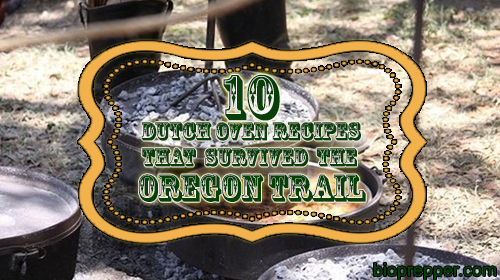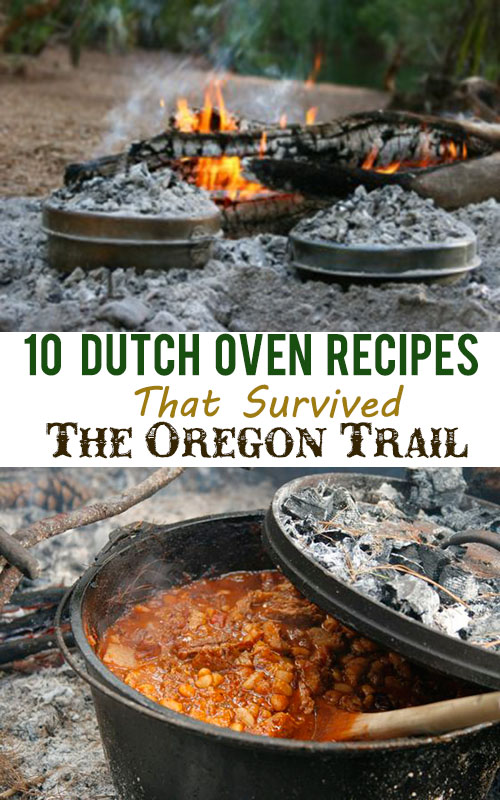Though the pioneer women were used to cooking, doing so on an open flame was not something they knew how to do.

Cooking on the trail was not easy and they learned by trial and error. Pioneers built campfires twice a day (in the morning and at night) using what fuel they could find: buffalo chips, sagebrush or weeds. Bread, bacon and coffee were staples of their diet, augmented by any random harvest they could reap en route: fresh buffalo meat, rabbit or sage hen. In cutting a way for the road, the boys find thickets of wild currants. There are several varieties, the black, the red and the white. The boys cut the bushes, some of them ten feet long and loaded with ripe currants, which we strip off and make into jelly, currant wine and vinegar, dried currants and currant pie. In the early years of emigration, the pioneers could find and kill buffalo or antelope along the trail, but “a more dependable supply of fresh meat was a herd of cattle led behind the wagon.” And the milk provided by the milk cows was highly prized. Not only was there a supply of fresh milk, but butter could be churned during the day’s journey by hanging pails on the jolting wagon; by day’s end, the butter was ready for the freshly baked bread.
The pioneer cook had to be resourceful and ingenious when it came to cooking. She would have to improvise when supplies ran short, because no matter how well one packed the wagon, supplies did not always last as planned. For example, bacon, if not protected from the heat of the plains would go bad. It was standard for bacon to be packed in a barrel of bran to insulate it. Eggs were similarly packed in corn meal to keep them from breaking, but also because they’d be used to make bread. The women usually cooked breakfast and dinner. Lunch would have been ‘leftovers,’ often baked beans or stew with bread or biscuits from the night before. Below are a few recipes from common ‘trail’ foods. Enjoy !
10 Dutch Oven Recipes That Survived The Oregon Trail
Soda Bread
To make dough, mix 1 teaspoon of baking soda with 1 cup warm water, add 2¼ cups flour and 1 teaspoon salt. Knead well. The dough may be used at once or allowed to rise overnight in a warm place. In either case, flatten dough to a thickness of 1 inch. Place on a greased cookie sheet and bake in a 400° oven for 25 minutes.
Dried Apple Pie
Soak 2 cups of dried apples in water overnight. Drain off water and mix apples with ½ cup sugar and 1 teaspoon each of allspice and cinnamon. Line an 8-inch pie pan with a crust, and add the apple mixture. Dot with 3 tablespoons butter and cover with a second pie crust. Make a few slashes in the top for ventilation and bake in a 350° oven for about 1 hour or until crust is golden brown.
Fried Apples
Fry 4 slices of bacon in a Dutch oven. Remove bacon.
Peel and slice 6 to 8 Granny Smith apples.
Put apples in Dutch oven with bacon grease,
cover and cook down the apples, but not to mush.
Serve topped with butter or cream and crumbled bacon.
They’re great for breakfast or desert!
Dutch Oven Trout
As soon as possible after catching your trout,
clean them and wipe the inside and outside of the trout
with a cloth wet with vinegar water.
Don’t put the trout in the water.
Roll the trout in a mixture of flour,
dry powdered milk,
cornmeal,
salt and pepper.
Heat deep fat in a Dutch oven and fry until crisp and golden brown.
Oregon Trail Breakfast
Cornmeal Mush
1 Cup cornmeal
4 Cups boiling water
1 Tablespoon lard
1 Teaspoon salt
Dried currents
Put currents into water and bring to boil. Sprinkle cornmeal into boiling water stirring constantly, adding lard and salt. Cook for about 3 minutes. Pour in bowls and top with milk, butter and molasses.
How To Fry Quick Doughnuts
The following recipe for doughnuts came from the March 17, 1885 Daily Missoulian. Obviously, anyone making these doughnuts will want to find a substitute for fat as a cooking oil.
Put a frying kettle half full of fat over the fire to heat. Shift together one pound of flour, one teaspoonful each of salt and bicarbonate of soda, and half a salt spoon full of grated nutmeg.
Beat half a pound of butter to a cream and add them to the flour. Beat the yokes of two eggs to a cream, add them to the first-named ingredients, beat the whites to a stiff froth and reserve them.
Mix into the flour and sugar enough sour milk to make a soft dough and then quickly add the whites of the eggs. Roll out the paste at once, shape and fry.
Brown Gravy
The following is a farm recipe for gravy from the late 1880’s.
This gravy may be made in larger quantities, then kept in a stone jar and used as wanted.
Take 2 pounds of beef, and two small slices of lean bacon. Cut the meat into small pieces. Put into a stew-pan a piece of butter the size of an egg, and set over the fire.
Cut two large onions in thin slices. Put them in the butter and fry a light brown, then add the meat. Season with whole peppers.
Salt to taste. Add three cloves, and pour over one cupful of water.
Let it boil fifteen or twenty minutes, stirring it occasionally.
Then add two quarts of water, and simmer very gently for two hours.
Now strain, and when cold, remove all the fat.
To thicken this gravy, put in a stew pan a lump of butter a little larger than an egg, add two teaspoonfuls of flour, and stir until a light brown.
When cold, add it to the strained gravy, and boil up quickly. Serve very hot with the meats.
Coffee Roast
Cowboys loved their coffee.
Here’s a recipe where coffee is actually used in cooking a roast.
Cut slits in a 3 to 5 pound brisket. Insert garlic and onion into the slits.
Pour one cup of vinegar over the meat, and work it into the slits.
Marinate for 24 to 48 hours
Place in a Dutch oven.
Pour 2 cups of strong coffee and 2 cups water over the meat.
Simmer for 4 to 6 hours.
If necessary, add water during the cooking.
Boy in Bag
2 cups raisins
1 cup chopped walnuts (black walnuts are fine)
1 cup dark brown sugar, firmly packed
1 cup chopped suet
2 teaspoons baking powder
1 teaspoon cinnamon
1 teaspoon nutmeg
1 teaspoon allspice
1 teaspoon salt
2 cups flour
1 ½ cups milk
1 cup chopped dried fruit of any kind.
Chop suet into small pieces no pieces being larger than a bean.
Combine with raisins, nuts, brown sugar, and chopped dried fruit.
Then mix flour, spices, and salt with baking powder.
Add gradually to fruit mixture with milk, beating well.
Put in flour sack or tie in large square of cloth. Put in kettle of boiling water and boil 3 hours, always keeping enough boiling water, and put on cloth to drain.
After about ½ hour, untie cloth and turn pudding onto dish. Let chill.
Slice and serve with hard sauce.
This pudding will keep well and is similar to plum pudding.
This can be made in camp with molasses instead of brown sugar. Or can be made with white sugar instead of either brown sugar or molasses.
This was a great favorite with chuck wagon cooks.
Sourdough Cornbread
Here is a recipe to use some of the sourdough starter we shared with you previously.
1 cup starter.
Enough cornmeal to make a beatable batter
1 ½ cups milk
2 tablespoons sugar
2 eggs beaten
¼ cup warm melted butter, or fat
½ teaspoon salt
½ teaspoon soda
Mix starter, cornmeal, milk, eggs and stir thoroughly in large bowl.
Stir in melted butter, salt and soda.
Pour into a 10 inch greased frying pan or Dutch oven,
and bake for 25 to 30 minutes.
Saving our forefathers ways starts with people like you and me actually relearning these skills and putting them to use to live better lives through good times and bad. Our answers on these lost skills comes straight from the source, from old forgotten classic books written by past generations, and from first hand witness accounts from the past few hundred years. In short, the pioneers lived more simply than most people today are willing to live and that is why they survived with no grocery store, no cheap oil, no cars, no electricity, and no running water. Just like our forefathers used to do, The Lost Ways Book teaches you how you can survive in the worst-case scenario with the minimum resources available. It comes as a step-by-step guide accompanied by pictures and teaches you how to use basic ingredients to make super-food for your loved ones.
WHAT TO READ NEXT:
HOW TO MAKE YOUR OWN BACON (STEP BY STEP GUIDE)
A RETURN TO THE OLD PATHS: HOW TO MAKE PEMMICAN LIKE THE NATIVE AMERICANS
20 LOST RECIPES FROM THE PIONEERS: WHAT THEY COOKED ON THEIR JOURNEY WESTWARD
SEVEN CLASSIC GREAT DEPRESSION ERA RECIPES GRANDMA USED TO MAKE
POTTED MEAT: A LOST SKILL OF LONG TERM MEAT STORAGE
BACK TO BASICS: HOW TO MAKE AND PRESERVE LARD
THE BEST WAY TO STOCKPILE VEGETABLES OFF-GRID
OLD FASHIONED PRESERVING-GRANDPA’S RECIPE FOR CURED SMOKED HAM
HOW TO MAKE GUNPOWDER THE OLD FASHIONED WAY
SURVIVAL HERBAL RECIPES FROM OUR ANCESTORS
HOW TO PRESERVE MEAT FOR SURVIVAL LIKE OUR GRANDFATHERS
Survival Books
THE LOST BOOK OF REMEDIES-All Medicinal Plants and Lost Cures of North America
THE LOST WAYS-Learn the long forgotten secrets that helped our forefathers survive famines,wars,economic crisis and anything else life threw at them
EASY CELLAR-AMERICA’S NATURAL NUCLEAR BUNKERS: FIND THE CLOSEST ONE TO YOUR HOME
THE LOST WAYS 2-This lost super-food will bulletproof you against any food shortage or famine
BLACKOUT USA-EMP survival and preparedness guide
DIY HOME ENERGY-Follow the step-by-step guide from A to Z and you will have a working system to reduce your electricity bills and save energy
MY SURVIVAL FARM-This hidden survival garden will keep you well fed when SHTF
CARNIVORE’S BIBLE -THE REAL HOMEMADE AND HEALTHY MEATY TREATS OUR GRANDPARENTS USED TO MAKE…





Just thought I’d mention too watch out cooking stews in the Dutch oven,can cause iron overdoses.
These recipes would be better if they had the directions to cook them over the fire or coals.
I plan on trying some that don’t have those directions. When I do I will post them.